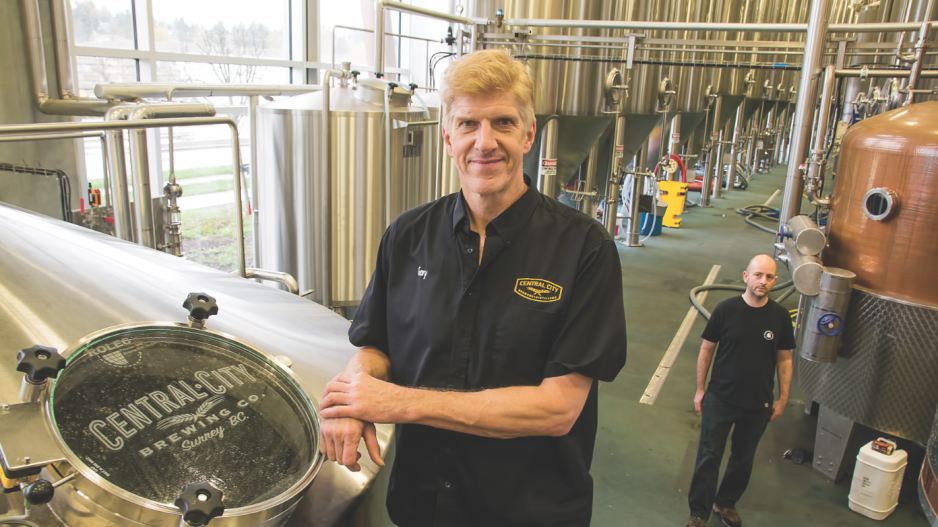As Vancouver’s craft brewing industry continues to boom, the Fraser Valley is looking to hop up a few notches on the local beer scene.
Central City Brewers + Distillers brewmaster Gary Lohin said he’s in contract talks with a couple of hop farmers in the Fraser Valley to produce crops for his recipes. While the main ingredient for beer is barley, which in Central City’s case primarily comes from the Peace River region, hops are also used for flavouring. Lohin said he spends about $2 million annually on about 20 different varieties of hops and gets a small percentage locally, which he’d like to expand.
Central City buys most of its hops via a broker in Washington State, paying U.S. dollars, and also orders them from overseas, so finding more local suppliers could save production costs – if the product is on par with his current suppliers, Lohin said.
“They have to be as good as the hops that I’m buying right now,” he said. “They can’t make my beer weaker, and the price has to be somewhat competitive. I can’t subsidize a local farmer at my expense either.”
Lohin noted many strains of hops are protected or patented, meaning they can’t legally be grown by anyone else. However, he added, the Lower Mainland climate is perfect for hop growing, as it has hot, dry summers followed by mild, rainy winters.
The British Columbia domestic beer market has been growing steadily for close to a decade, according to a report by Agriculture and Agri-Food Canada. Sales of local beer have been expanding at a 17% annual rate since 2010. According to the study, small-scale breweries in B.C. (producing less than 15,000 hectolitres annually) have increased sales by 51.75% from 2014 to 2015, and of the 102 craft breweries with headquarters in the province, 60 of them have opened in the past five years.
The emergence of the Lower Mainland’s craft beer scene has also spawned some new players in the Fraser Valley. Trading Post Brewing opened in January 2016 in Langley with a brewery and tasting room, and has since opened a tap house and eatery in Fort Langley. The company now has 60 employees, and founder and general manager Lance Verhoeff said the company is already sourcing hops and berries from Fraser Valley farmers for its craft beer recipes. Verhoeff added that given its proximity to local farmers, Trading Post can also give its spent grain back to the community. Leftover malt from the brewing process accounts for most of a brewery’s by-products and can be used to feed livestock.
“Being in the agricultural centre allows us to give our spent grain to local farmers at no cost, whereas many brewers in [Vancouver] have to pay companies to ship it out to farms,” Verhoeff said
Zach VanLeeuwen, operations manager for Old Yale Brewing in Chilliwack, said he’s been working with local farmers to produce custom hops for a few years, and also sources locally grown rye used in the company’s BC Backyard Lager.
The Fraser Valley’s ample farmland has helped its restaurant scene become known for its various farm-to-table menu items. Of the region’s 2,821 farms, 94% are located in Langley, Surrey, Maple Ridge, Richmond, Delta or Pitt Meadows, according to Metro Vancouver’s website.
Matthew Stowe, director of culinary operations for the Joseph Richard Group, said food and ingredients such as herbs, chicken and produce from the Fraser Valley represent about 40% of the menu items at the company’s restaurants.
“We have as much local influence on our menus as possible,” Stowe said. “We’re working on an Italian concept with a micro-green supplier in South Langley – so micro-basil, micro-cilantro. And there’s some future concepts that we’re going to be working on where I basically give them a seed list and ask them to plant certain things.”
Surrey City Development Corp. helped set up brewery
Central City Brewers + Distillers got a leg up in 2013 when it opened its 65,000-square-foot brewery and distillery facility in north Surrey from the city’s own Surrey City Development Corp. (SCDC).
Lohin said his company, which was founded in 2003 and now has 168 employees, took off after the swift success of it Red Racer line. The company was expanding its market at a breakneck pace, but couldn’t find affordable real estate to open a new facility. The joint partnership had the SCDC initially serving as the landlord for Central City’s Bridgeview Drive location, which also serves as its headquarters. Now the company owns the property outright after buying it from the city through a clause in the contract.
“I can’t see Vancouver doing that, or Burnaby doing that, so it’s quite unique,” he added. “We were looking for a place to expand and real estate is quite expensive. And (the SCDC) stepped up and provided us with an area that really helped us.”




